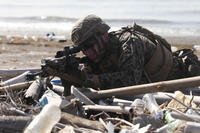The Navy says the aircraft carrier USS Abraham Lincoln's water tanks have been cleared of bacteria just over a month after the crew first reported contaminated water while the ship was sailing off the coast of southern California.
In an email to Military.com, a Navy spokesman said that "all potable water tanks on board the ship have been tested and are clear of E. coli."
The Navy previously said that the contamination that caused water on the ship to have a foul odor and appear cloudy was not tied to the E. coli, despite a string of positive tests for the bacteria. To date, the service has not explained what substance was in the water that caused the change in appearance and smell.
Read Next: Meet the Vets Running for Congress, the Largest Group of Candidates Who Served in a Decade
The contamination reportedly came from wastewater from the ship's bilges, a system that often collects substances like jet fuel and oil.
But it would appear that the Navy didn't initially test for any of the heavy metals or oils that may have made their way into the water system, and which may have accounted for the problems with the water that sailors reported.
After news of the contaminated water broke on Sept. 21, the ship's commander, Capt. Amy Bauernschmidt, addressed the crew on several occasions. Some of her comments were captured on four, undated videos that were later posted to social media. In three of those videos, Bauernschmidt firmly tells her crew that there is no jet fuel in their water.
Bauernschmidt would likely have been referencing concerns tied to water contamination aboard the USS Nimitz -- another aircraft carrier -- that had occurred only days earlier.
That incident demonstrated that once a contaminant gets into the system, it can be hard to remove. The Navy declared the jet fuel contamination resolved just days after initial reports on the Nimitz but had to reverse course within a week as the fuel kept showing up in tests. Then, reports of illnesses started to trickle in, too.
At the time that Bauernschmidt was assuring her crew that there was no jet fuel in the water, she would likely have had no way of knowing that the source of the issue was bilgewater leaking into drinking water tanks through a hole in an air vent line, as the Navy has subsequently reported.
Navy spokesman Ensign Bryan Blair told Military.com that "engineering and medical personnel tested the water for bacteria and chlorine" -- not petroleum products like jet fuel or heavy metals -- on that first day. A Navy medicine publication on water quality aboard ships notes that the crew is responsible for testing the pH and salt content of the water, as well as making sure it is free of E. coli and similar bacteria. The document makes no mention of testing for other compounds.
The Navy maintains that the videos show "the efforts of a commanding officer trying to keep her crew informed to the best of her ability." In fact, in one video, Bauernschmidt is heard telling the crew about the E. coli contamination that the service said was discovered on Sept. 22.
The Navy has maintained that "a thorough inspection of the ship's potable water supply" was conducted; the three E. coli-infected tanks were quickly isolated from the rest of the potable water system; and free bottled water was made available to the crew.
According to Navy spokesman, Cmdr. Zach Harrell, the ship had about 6,500 bottles of water onboard when the contamination began and "the ship’s supply department ordered more than 12,000 additional bottles of water, which were delivered by CMV-22B Osprey between Sept. 23 and 26."
On Sept. 24, the Lincoln sent samples off to be analyzed by an outside lab. This would have been the first opportunity for the ship to know whether the water onboard -- with the contaminated tanks now isolated -- was tainted by anything besides bacteria.
The Navy's statement on the results -- which came back two days later -- said "the water was within drinking water standards for pH, turbidity, aluminum, copper, lead, sodium, and hardness." Missing in that list is any indication that the water was tested for jet fuel or any other petroleum products.
In one of the posted videos, Bauernschmidt noted "there were two that were inconclusive, which meant ... they couldn't 100% tell for 100% certainty that there wasn't something in there but definitely negative for JP5 [jet fuel]."
Military.com asked the Navy what the two inconclusive tests showed but did not receive a response before publication.
The Navy has said that no sailors have reported being made sick by the contamination episode.
Editor's Note: This article has been updated with additional details provided by the Navy after publication about how much bottled water the Navy had stocked aboard the USS Abraham Lincoln.
-- Konstantin Toropin can be reached at konstantin.toropin@military.com. Follow him on Twitter @ktoropin.
Related: Navy Says It Has Found the Source of Water Contamination Aboard Carrier, Leading to More Questions













